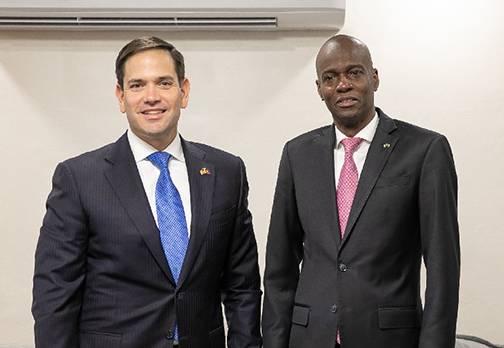By Dessalines Ferdinand, Le Floridien
Impact of President-Elect Trump’s Immigration Policies on the Haitian Community
(Miami) — The prospect of Haitians retaining hope for resolving their nation’s deepening crises under a second Trump administration, with Senator Marco Rubio as the potential Secretary of State, is both complex and uncertain.
President-elect Trump has consistently signaled a hardline approach to immigration, one that could have far-reaching consequences for the Haitian community in the United States. Among his proposed policies is the termination of Temporary Protected Status (TPS), a lifeline for many Haitians, offering deportation protections to those fleeing instability. If enacted, this policy could result in mass deportations, tearing apart families and exacerbating the challenges faced by Haiti’s fragile society. Additionally, Trump’s campaign rhetoric, which has included unsubstantiated claims about Haitian migrants, has been widely criticized for perpetuating misinformation and stoking anti-immigrant sentiment.
In stark contrast, Senator Rubio has demonstrated a track record of support for Haiti, notably through bipartisan initiatives such as the Haiti Economic Lift Program (HELP) Act, aimed at fostering economic growth and stability. Rubio has also been a vocal advocate for re-designating TPS for Haiti, underscoring the dire conditions in the country and the need for continued U.S. support for Haitian nationals.

Florida Sen. Marco Rubio knows the Haitian-American community and is familiar with Haiti. He possesses a substantial understanding of Haiti’s political landscape, informed by his legislative initiatives and advocacy efforts. Representing Florida, which hosts a significant Haitian-American community, Rubio has engaged directly with Haitian issues. He co-sponsored the Haiti Development, Accountability, and Institutional Transparency Initiative Act, emphasizing human rights and anti-corruption measures in Haiti. These actions reflect his commitment to Haiti’s political and economic stability.
Haiti’s challenges are profound. The nation has been in turmoil since the assassination of President Jovenel Moïse in July 2021, an event that plunged the country deeper into chaos. With a dysfunctional government, a fractured national transitional council, and the removal of key leaders, Haiti has descended into a state of lawlessness. Gangs now control an estimated 80% of the capital, Port-au-Prince, rendering large swathes of the city ungovernable.
Efforts to stabilize the country, including the U.S.-funded Multinational Security Support Mission led by Kenyan police, have so far yielded little progress. Observers argue that Haiti’s situation demands robust international intervention under the “responsibility to protect” principle. Without decisive action, the cycle of violence and instability is unlikely to diminish.
There is broad recognition that the international community, led by the United States, has a moral imperative to intervene and protect Haiti’s civilian population. However, such an undertaking may be unlikely under a Trump presidency. Trump’s previous disparaging remarks about Haiti, including false accusations that Haitians were “stealing and eating pets,” reflect a dismissive attitude toward the country. For a leader with a history of reluctance toward foreign interventions, a military operation in Haiti—even one just 700 miles from his Mar-a-Lago residence—may not be a priority.
Meanwhile, Haitians in the United States, including those in Springfield, Ohio, face uncertain futures. Many are living under the Biden administration’s granting of TPS, a status that Trump and Vice President-elect J.D. Vance have vowed to rescind. This move would subject thousands of Haitians to immediate deportation, exacerbating the crisis both in the U.S. and in Haiti.
The contrasting approaches of President-elect Trump and his prospective Secretary of State nominee Rubio point out a potential clash of priorities within the incoming administration. While Rubio’s record suggests a commitment to supporting Haiti through legislative measures and diplomatic advocacy, the broader policy agenda of the Trump administration may limit his influence. President-Elect Trump’s focus on strict immigration enforcement and his disregard for humanitarian concerns are likely to overshadow Rubio’s potential efforts to address gang violence and stabilize Haiti.
For Haitians living in USA, the hope for a resolution to their country’s crises appears dim under a Trump presidency, even with Rubio in a key diplomatic role. The administration’s priorities are unlikely to align with the urgent needs of a failed state on the brink of collapse. As Haiti continues to grapple with profound challenges, the question remains whether the U.S. will step forward as a leader or retreat from its responsibility to support a neighbor in dire need.
